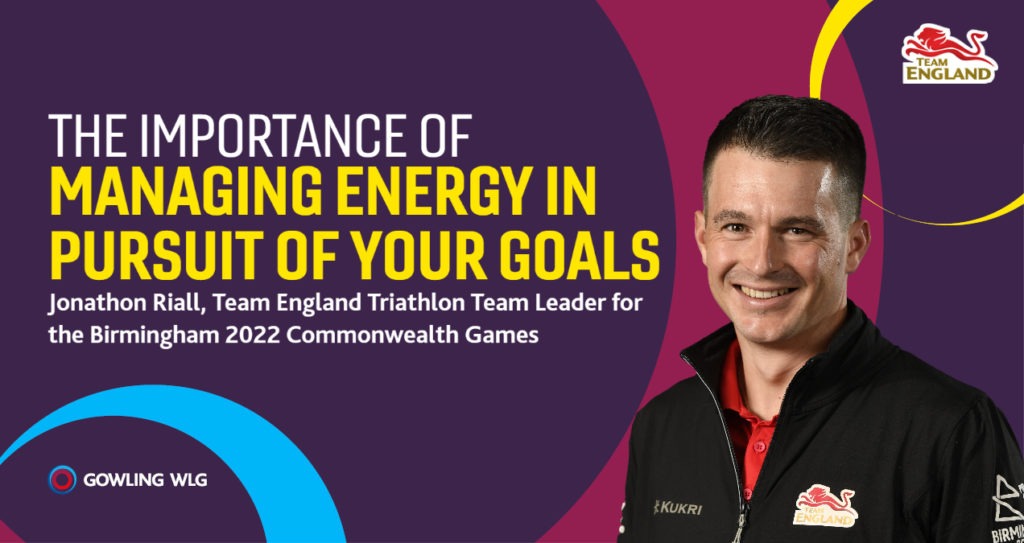In this guest blog, we hear from Jonathon Riall, Paralympic Head Coach at British Triathlon and Team England Triathlon Team Leader for the Birmingham 2022 Commonwealth Games. With over 10 years’ experience as head coach, Jonathon has been integral to the development of the UK’s para-triathlon programme. Jonathon guides us through the importance of taking a step back in order to move forward, maintaining good physical and mental health, and how to successfully manage a team.
The task of becoming a Paralympic champion or an Olympic champion is something hard to even begin to explain, it pushes anybody who attempts it to the limits of what the human body can handle. It is a relentless rollercoaster that guarantees only one thing; you are going to fail many more times than you will ever succeed. It requires every ounce of energy, both physical and mental, and then it will ask for that energy every day, for anything up to 20 years of your life. All of that comes with no certainty of winning anything, and for many athletes who do win medals and trophies and championships there is still no certainty of financial gain or long-term security.
The drive to dedicate your all to something comes from a place of passion, from a love for your sport, from the friendships you build, or the challenge to master your task. But many times the expectations from the media, fans, or even from within athletes’ own sports can take an athlete so far away from the original reasons they started in the first place.
I paint this picture to help shine a light on the reality of how it can feel to be an athlete in many non-professional sports. For every athlete who ends up on top of the world, there will be more who don’t and, unfortunately, some who end the whole process will be disillusioned and at significant risk of long-term mental health challenges.
But even though elite sport can create these issues, ironically, I think the process to develop physical athletic capacity can also help managers, leaders and coaches to be better at helping those they lead to avoid the risks of burnout and the long-term effects that come with it.
Take for example the basics of any performance plan, it has clear aims and objectives that help to break down the enormity of the end goal, and then it has periods of overload, i.e. the hard work, but critically it must have periods of rest and recovery. Even during the hard work, areas like nutrition and physiotherapy are essential to maintain good health. These elements of recovery and holistic care are the ones that I try to apply, not only to the athletic journey people take, but also the psychological one too.
In short, we would never expect an athlete to train for 24 hours a day every day, so why would we think that a similar amount of mental load targeted in only one area is suitable either. Therefore, to link to the title of this blog – not only is it ok to allow an athlete to step back at times but it’s mission-critical that they do in order to stay healthy within this world.
I think the same applies in any walk of life really, regardless of the pressure, or the weight we place on our goals. If we only apply ourselves to one thing, don’t include periods of rest, and have no support or value outside of that one thing, I think anybody would be at risk of feeling a bit lost.
In a lead coach or manager position, I am acutely aware of how careful you need to be when accepting certain behaviours, as the behaviour we accept will quickly become the culture of the place you lead. So again linking back to the purpose of this blog, I’ve explained the importance of stepping back at times, but I am also really strong in my belief that if those in your care regularly have to step back as a direct consequence of the culture you lead, this is absolutely not ok. If systematically your environment, behaviours and culture push people towards burnout and mental health challenges, then something is significantly wrong.
Most of the time, this type of culture is created to get results, and in some cases, it can be successful in the short term, but I firmly believe that a culture where people are encouraged to find value outside of work or sport, a one that manages peoples physical and emotional energies well, and that is built upon a healthy culture will have much more successful outcomes over a much longer period of time.
I am incredibly proud to have led a team where our athletes have gone on to achieve such a wide range of things on top of their athletic successes. We have seen our athletes become lawyers, start medical degrees and PhD degrees in Psychology, we have published authors, actors, TV stars, ambassadors and board membersfor national charities, professional physiotherapists, West End percussionists, qualified coaches and mentors.
This culture of creating value as an individual outside of the sport is our little way to help athletes avoid being forced to step back, but when they do, as it is also possible in the pressured world of elite sport, it is always ok, and people will always be supported through those times.

